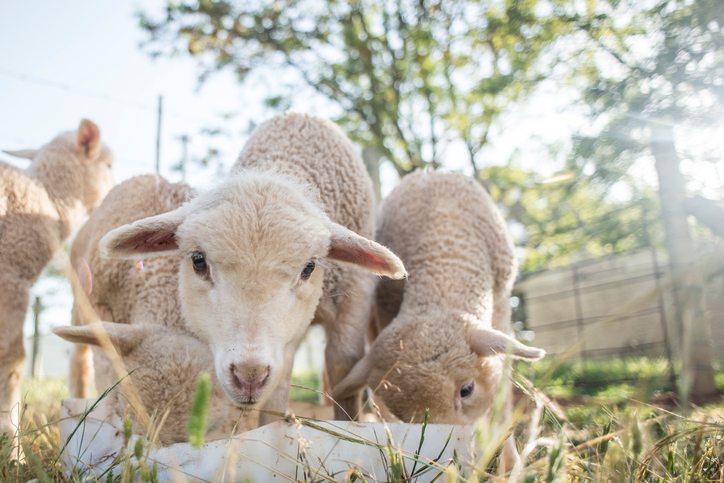
The type of sheep feed you use can make a huge difference in the quality of your flock’s production. As a staple in the agriculture industry, sheep are among the earliest animals man domesticated for use in agriculture. To this day, sheep remain an important source of wool as well as meat and dairy products.
Like cows, poultry, horses, and other common livestock, sheep have specific nutritional needs that require careful consideration to achieve ideal productivity and health. Sheep benefit greatly from the addition of feed supplements. Most flocks acquire the majority of their basic nutrition through foraging, but when nutritional requirements can’t be satisfied, additives will be necessary.
The Role of Sheep Feed
Sheep feed is commonly called ruminant animal feed. Ruminant animals are characterized by their digestive system, which features multiple stomachs.
Common ruminants include:
- Sheep
- Cows
- Buffalo
- Goats
- Deer
Ruminant animals also include more exotic fauna, such as giraffes and moose. Although ruminant animals share a number of biological features, agricultural producers should only ever supply feed that’s intended for the recipient species.
The unique digestive system of a ruminant animal involves a two-step process:
- Food is consumed and partially digested, resulting in a mixture of food and saliva called cud.
- The cud is regurgitated into the mouth of the animal and chewed until it is ready for full digestion.
Sheep Feed Ingredients
Like horses and cows, sheep enjoy the ability to graze on hay and grass. In particular, sheep tend to enjoy fine, leafy hay, as opposed to coarser strains that many farms use. Knowing this, many farmers feed their sheep and cattle at the same time, using the same bales of hay. The sheep pick through the feed supply to eat the finer grass, while the cattle consume the course, rough hay.
In general, sheep are able to consume all the basic nutrition they require from pasture grazing. Because of this, many farming operations only purchase sheep feed during the winter when pastures freeze over and access to foraging is restricted. Sheep feed is specially formulated to provide animals with the five categories of nutrients they need: water, energy, protein, vitamins, and minerals.
Key sheep feed ingredients:
- Alfalfa
- Corn
- Vitamin A
- Vitamin D
- Vitamin E
- Selenium
- Mineral salt
- Calcium
- Phosphorous
Sheep feed is typically produced in the form of grasses and not pellets. This allows the sheep to consume food in a form that feels familiar.
Common Sheep Feed Additives
The use of additives in sheep feed can provide a boost to herd health, as well as address health problems with individual animals. Some of the most common additives for sheep feed are antibiotics, ionophores, and probiotics.
Sheep feed antibiotics function much like human antibiotics by offering critical protection against illness and disease. One of the most common sheep feed antibiotics is oxytetracycline. It protects pregnant ewes from illnesses that have the potential to threaten the life of unborn lambs.
Ionophores are specialized additives that assist ruminant animals with digestion and feed utilization. It also helps protect against harmful bacteria that sometimes find their way into the digestive tract of sheep, such as coccidia.
Probiotics, like yeast, are small living organisms that improve digestion and immunity. Many types of sheep feed include probiotics.
The most effective types of additives:
- Acidifiers
- Organic minerals
- Digestive enzymes
- Direct fed microbials
In addition to health and production benefits, sheep feed additives can also be used for the purpose of preparing an animal to take part in shows. High-quality additives will improve muscle tone and overall topline, contributing to a healthy sheep that makes a great appearance.


It’s interesting that adding yeast to feed can help improve an animal’s digestion and immunity. I’ve been thinking about buying some cattle for my farm, and I want to make sure they’re healthy. It might be a good idea to find some probiotic cattle feed to make sure the cows have good digestion.
Thank you for the terrific post